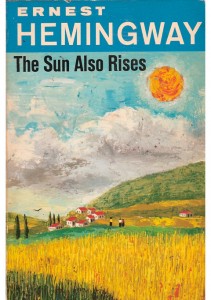 Wealthy Drunks Swan About Europe
Wealthy Drunks Swan About Europe
Hemingway, Ernest (1926). The Sun Also Rises. New York: Scribner’s Sons.
This was Hemingway’s first novel, written shortly after a visit to Spain, where the novel is mostly set. It famously features vividly colorful descriptions of bullfights and the running of the bulls in Pamplona.
The story is a love triangle. First-person protagonist, Jake, an American newspaperman in Paris, is in love with an English aristocrat, Lady Brett, and she reciprocates his love, but they are held apart by the fact that Jake was wounded in World War I and is impotent. As Lady Brett has high libido and enjoys expressing it, her relationship with Jake is doomed to Platonic frustration. The other acute angle is Robert Cohn, a close friend of Jake’s in Paris, and a Jew, who sleeps with Brett (who doesn’t?), but he took the encounter as proof of true love.
Over the course of the novel, Jake comes to be jealous of Cohn and breaks off the friendship, even though he knows he himself can never be a competitor for Brett. For her part, Brett scorns Cohn’s possessive mooning and vows to marry Mike, another gentleman. This crowd is soon joined in Spain by Bill, an American gentleman.
And they are all gentlemen of means. Only Jake is a working man (although he doesn’t actually do much work in the novel, but at least he has a job and plenty of money). The others are idle and rich. They knock about Europe aimlessly, bored and drunk, treating the locals badly, hoping perhaps to find some kind of direction, or at least amusement, which is how they ended up in Basque country.
The narrative of the story is 95% drinking, eating, getting drunk, being drunk, sleeping it off, getting up at noon, eating again and getting drunk again immediately. Prodigious quantities of alcohol, more than what is believable, are consumed by all.
Brett becomes smitten by a young bullfighter and runs off with him, to everyone’s dismay, and the party is over. Jake finds her in Madrid, alone and broke. He takes her home.
Plot, there is none. Story through-line, no. The text is mostly a set of loosely connected, impressionistic scenes featuring all these characters being drunk. The balance is the vivid descriptions of the festival of bulls that they all watch, drunk. So why is this considered one of the greatest American novels?
It does leave you with a feeling for how affluent Westerners after the war were left without meaning and direction. The war had been so brutal, destructive, and stupid, that the prior values of the aristocracy were destroyed. The upper classes can only reign over the rest of us if we look to them as paragons of virtue. If nothing means anything anymore, and virtue is undefined, the rich have nothing to do but get drunk. That sense of mood was palpable in the novel, a considerable achievement. In that way, it is comparable to how Robert Bowles, in The Sheltering Sky, evoked the nihilism that prevailed after World War II.
The writing is Hemingway-esque, as it were. It’s hard to find an adjective or adverb anywhere in the book. Subordinate clauses? Forget about them. Everything is written in simple sentences with strong nouns and verbs. That is certainly worth noting, although The Old Man and the Sea is a better demonstration of that style.
There are some sub-themes of minor interest. Brett’s promiscuity would have been radical at the time, as the traditional roles for women changed in the 1920’s. Jake’s quiet nobility (though he is not a nobleman) is interesting, especially since he is deprived of reproductive capacity, which seems to stand for his “manhood.” He is thus the least among the men, yet the most admirable.
Jake makes up for his deficiency perhaps by being enthralled with the bulls. The bullfight is a symbol for the War – cruel and bloody, but ultimately pointless, staged for the amusement of the callous few. The heavy drinking might be a comment on prohibition in America. The frustrated relationship between Jake and Brett is enigmatic, implying as it does that love requires sex, but proving just the opposite. These themes are all interesting, though subtle and not particularly insightful.
The dialog is appallingly repetitive and boring. Yes, there is the occasional subtext, for example, where sexual jealousy of Cohn is expressed as anti-Semitism, but this is not Hills Like White Elephants. It is just plain, boring dialog, and there is lots of it to wade through.
May a bull gore my belly for feeling only lukewarm about this iconic novel, but apart from the colorful descriptions and Hemingway’s terse writing style, The book is only mildly interesting. Worth the read because it is short, and because you cannot hold your head high if you have not read it, but it does not go on my list of favorites.
